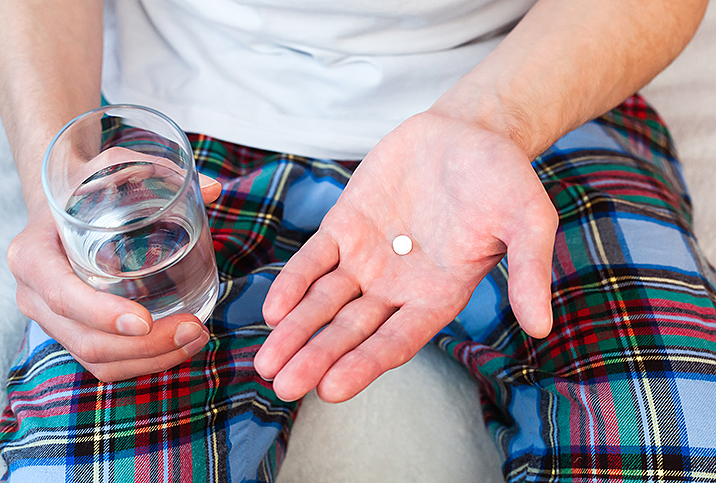Coming Off Antidepressants—How Much Do We Really Know?

Four years ago, I started taking an antidepressant called Paxil. I'd just ended a five-year relationship and moved cross-country for a job that I loved, but I was suffering from emotional burnout. I was feeling panicky and thinking irrationally negative things. It was the start of a prolonged episode of anxiety that made it hard to rest, work productively and enjoy life in my new city.
The drugs worked, combined with cognitive-behavioral therapy and some serious slowing down, and the anxiety dulled. But I was frustrated by how the antidepressants impacted my ability to concentrate. I was also ready to enjoy being single for the first time in years and was suffering from one very common antidepressant side effect: it was almost impossible to orgasm.
Easing off the drugs wasn't as easy as I expected. I felt restless and moody, and I was worried my anxiety was coming right back. It took three attempts, tapering more slowly each time, but eventually, I was able to wean off without feeling any major withdrawal symptoms.
Recently, a group of general practitioners and psychiatrists pulled together the information I needed at the time: a high-quality independent review of all the evidence that exists about coming off antidepressants, published in the Cochrane Database of Systematic Reviews. What they found was alarmingly inconclusive.
A 40 million person problem
According to the Centers for Disease Control (CDC), 13.2 percent of adults in the U.S. use antidepressants, totaling about 42 million people. Many more women use antidepressants than men, and they're extremely common among elderly populations: One study found 54.7 percent of all nursing home residents in the U.S. are taking them, according to a 2018 review of the literature in Innovation in Aging.
Despite the huge number of people using the medication across the world, the Cochrane Review authors found a serious lack of scientific information. "There are over 1,000 studies looking at starting antidepressants," said Professor Ellen Van Leeuwen from the University of Ghent, Belgium, the review's lead author. "Yet we found only 33 trials around the world that examined stopping them."
'No evidence-based reason' for long-term use
If you've taken antidepressants, your doctor might have recommended continuing them for about six to nine months after you start to feel better, which is what most national guidelines suggest. Despite this, more than half of Americans on antidepressants have been taking them for more than five years, and that number is similar in the UK and Australia. Surveys showed that more than a third of all people using antidepressants have "no evidence-based reason" to continue taking them, according to Cochrane Review co-author Professor Tony Kendrick of the University of Southampton.
Taking antidepressants for any amount of time comes with downsides—although it's important to note that for a lot of people suffering from depression, the benefits far outweigh the harms. Antidepressants have side effects, such as impaired sleep patterns, weight gain, emotional numbness and the dreaded sexual dysfunction I experienced. "We know that long-term antidepressant use is a major concern around the world," Van Leeuwen said. "It's of critical concern that we don't know enough about how to reduce inappropriate long-term use."
Withdrawal symptoms or depression coming back?
Imagine this: You start to taper off the medication, and first, you have trouble sleeping. Then you start to feel anxious, moody and suffer from bouts of crying or tearfulness. You feel detached or forgetful. Sounds a lot like depression, right? These certainly could be signs of depression returning, but they're also common withdrawal symptoms. The Cochrane Review authors pointed out that the similarity between depression and antidepressant withdrawal symptoms poses a serious problem.
"We want to raise awareness that withdrawal symptoms from antidepressants are common, and can be mistaken for relapse of the underlying condition," Kendrick said. "Experiencing withdrawal symptoms isn't a sign that the patient has relapsed—it might be that they need to taper more gradually down to much lower doses instead, before eventually stopping."
How should you stop antidepressants?
If you're in a better mental space than when you started medication, and you're fed up with feeling restless or disconnected (or you miss those delicious bedroom moments), you might have thought about stopping your meds, just like I did. Most guidelines recommend "tapering," where you reduce your antidepressant dose by about half every week or two, for about a month.
However, the UK Royal College of Psychiatrists has released new advice stating that if you've been taking high doses or if you've been taking the medication for "many months or longer," you could start by reducing your dose by 5 to 10 percent, waiting a few weeks and seeing how you go before reducing further. This way, you could taper off over many months, or up to a year.
Everyone is different, and your doctor will be able to help you decide when is the right time to ease off, and how best to go about it.
Like me, you might need a few tries (and some patience) to work your way off the meds, and it could be an emotionally rocky experience. But if the timing is right, you should be able to work towards being medication and side-effect-free, with all the emotional and sexual benefits that come with that.


















